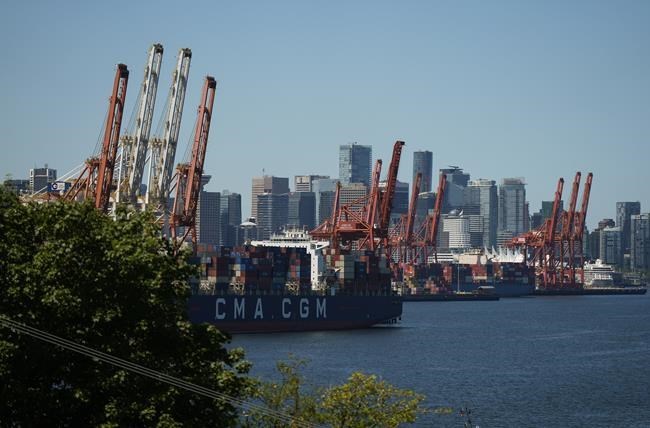The federal government's failure to fund a police force dedicated to Canada's ports is a threat to national security that needs to be dealt with immediately, says Delta, B.C., Mayor George Harvie.
Delta is home to the Roberts Bank Terminal, and expansion plans over the coming years will see millions more containers move through the Port of Vancouver annually.
Harvie says Canada's ports are the federal government's responsibility, but the "total absence" of uniformed police at the facilities makes them obvious targets for criminal elements to set up shop, from Mexican drug cartels to biker gangs.
"We're witnessing a relentless flow of illegal drugs, weapons and contraband into Canada through our ports and that threatens our national security," Harvie said in an interview Thursday.
"They need to recognize this. We have a fentanyl crisis going through our community here in Delta, through Metro Vancouver, through the province, across the nation,"he said of the federal government inaction.
The City of Delta released a report Thursday that it had commissioned about policing of Metro Vancouver port terminal facilities that says there's "literally no downside" for organized criminals to set up shop.
"Recently, ports scored very high in British Columbia’s provincial threat assessment with respect to the potential for infiltration and corruption," the report says.
The Port of Vancouver is made up of ports in several Lower Mainland locations, including Delta, Surrey and Vancouver, where roughly three million containers move through annually, and the Roberts Bank expansion will see more than two million more once completed.
The report highlights the difficulties of policing the ports since the Ports Canada Police force was disbanded in 1997, and more than a quarter century later, Harvie said the consequences of that decision have become clear.
The report by consultants Peter German and Doug LePard, both former high-rankingpolice officers, examines the state of port security since then.
Harvie said the Canada Border Services Agency checks less than one per cent of container traffic that comes through the region's ports.
He said the Vancouver Fraser Port Authority hasn't stepped in to bolster security at terminals because policing is not its responsibility.
"They say they have security cameras. Well, they sure don't do a lot for examining containers, and there's also a question with regards to lack of proper security checks for people who work at the port," Harvie said.
B.C. ports have been corrupted by the infiltration of organized crime groups, including the Hells Angels, as well as Russian, Asian and South Asian criminal organizations and Mexican drug cartels, the report says.
Harvie said lack of police resources dedicated to port facilities means criminal activities such as drug trafficking will only get worse, highlighting the need to "fortify" Canada's ports to protect communities and national security.
City officials recently met with officials within the U.S. Federal Bureau of Investigation and the Seattle Port Police, and Harvie said it was "shocking to them" that Vancouver's ports don't have a dedicated police force.
Harvie said he's also met with federal ministers in Ottawa who were similarly shocked over the lack of police at port facilities.
His next steps are to send a formal letter to the prime minister with a copy of the report and meet with the board of Port Metro Vancouver, he said.
Port authority officials, the report notes, have historically claimed to have no "knowledge about the activities of organized crime" at port facilities.
"I think it's just disgusting," Harvie said. "I just can't believe that they deny the active presence of organized crime within their operations."
"They don't even want our Delta police on their property. So again, I'm looking forward to discussing this directly with the members of the Port Metro Vancouver board," Harvie added.
Anita Gill, director of health, safety and security and port security officer at the Vancouver Fraser Port Authority, said in an email that "security and policing of our waterfronts is a multi-jurisdictional responsibility."
"We work closely with local police forces and the RCMP, terminal operators, and the Canada Border Services Agency (CBSA) to ensure safety and security at the Port of Vancouver," Gill said.
"We recognize that security and policing at B.C. marine terminals is a complicated issue and we’re always open to collaborating on ways to improve the current approach."
Doug Kiloh, former head of the RCMP's National Ports Enforcement Team, said in an interview Thursday that security at the ports is difficult due to the "hodgepodge" of agencies with jurisdiction there.
Kiloh said there are security "weaknesses" at port facilities that criminals can take advantage of, allowing them to "manipulate" the inflow and outflow of goods.
Now retired, Kiloh said pressures on policing are constant and when mixed with politics, problems may get attention in the short term when they come into the public eye and then "the political masters throw money at it."
"Then it goes away over time, or the rhetoric dies down and they fade away from that," he said.
Kiloh said port security and technology hasn't kept pace with port volumes and expansion over the last 20 years, while investigative hurdles have always challenged enforcement efforts.
"Getting in the way of commerce is a problem for the police," he said. "It costs somebody money."
This report by The Canadian Press was first published Sept. 28, 2023.
Darryl Greer, The Canadian Press



